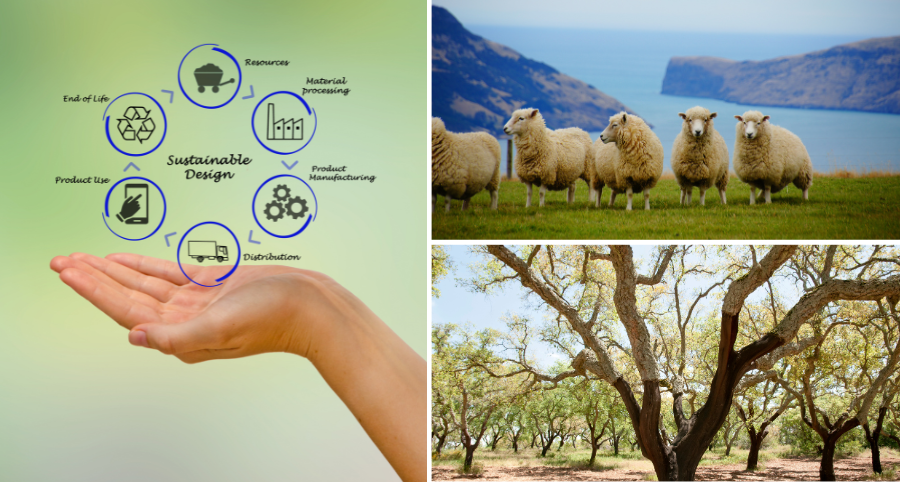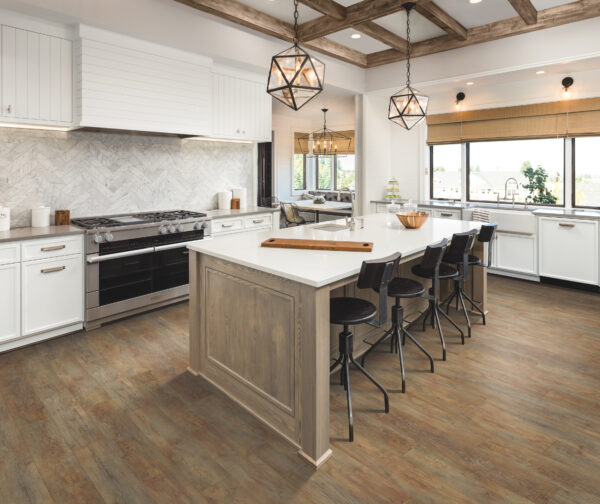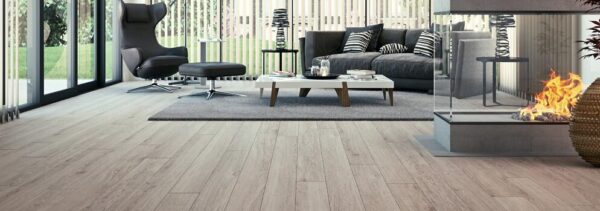Are you a conscientious consumer looking to do what you can to protect our environment? Luckily, when it comes to flooring, there are several eco-friendly options available on the market. This guide will help you navigate through these options. First, it’s important to understand that several factors affect whether a flooring material is environmentally friendly. Not all floors are created equal, and with the rise in popularity of sustainability, we must be cautious of companies greenwashing—labeling their products as “green” or eco-friendly when they are not.
Factors to Consider for Eco-Friendly Flooring
- VOC Levels & PVC Free
VOC stands for Volatile Organic Compounds, and they are the chemicals that are produced by industrial manufacturing. Products with a high-VOC produce off-gas which is harmful to humans and our environment. We see them pretty much everywhere in our daily lives, i.e. that new car smell… VOC’s! Look for products that are low-VOC or VOC-Free to help the environment and help you create a healthier home.
PVC stands for Polyvinyl Chloride, which is a plastic material that is used in many products but especially, building materials, such as window frames, roofing membranes and resilient vinyl flooring. It has a high energy consumption and Co2 emissions. The Canadian Government as recently introduced regulations limiting PVC products from entering the country as more and more research indicates that it is one of the most environmentally damaging types of plastics which also negatively impacts health at all stages of its lifecycle.
- Renewable Resources
Fortunately, there are a lot of flooring products that are produced from renewable resources which include, hardwood, cork, natural stone & wool carpet. Renewable resources are ones that can be replenished, i.e. natural wool is the ultimate renewable fiber, sheep grow wool continuously and are shorn every 9 – 12 months, then they return to the pastures to grow more wool.
- Recyclability
What happens when your floors reach the end of their life-cycle? Can the material be recycled and turned into something new or repurposed for another use, or is the final destination a landfill?
Many homeowners do not ask themselves these questions when shopping for new flooring. However, it is a key aspect to consider when you are researching and looking for your perfect flooring. Your decision could have a lasting negative impact on the environment long after you remove the flooring if it cannot be recycled.
Tip: If you cannot buy a flooring that can be recycled, look for one that is made from recycled products. Carpet is a great example for this because most of it ends up in a landfill. Manufacturers like Mohawk are producing carpet made entirely from recycled bottles.
- Material Life Cycle
If your floor offers a longer useful life-cycle, then you don’t need to replace your floor as often, which in turn reduces your waste and adds value as you save money.
It is important to choose something durable enough to withstand your home and lifestyle. Also, consider opting for something more traditional and timeless instead of something that is currently trending. Trends change fast and if you like to keep up with them, you could be creating a lot of waste in the process.
- Place of Origin
Flooring and the resources needed to manufacture flooring comes from all over the world. Transporting flooring and materials negatively impacts our environment due to the carbon emissions produced from shipping. This is why we need to consider where the flooring came from.
Although the materials and resources needed to manufacture the floors are most likely sourced oversees, try to look for products produced in North America or even better, in Canada! Beaulieu Canada carpet for instance is proudly manufactured right here in Canada.
- Sustainable Practices
Although there are a lot of products made from renewable resources, it does not always mean that those resources are being renewed or even harvested responsibly (hello greenwashing). Look for manufacturers that are third-party certified to ensure their practices are responsible and sustainable.
Top Sustainable Flooring Categories
Cork
Cork is pretty hard to beat as a green flooring option. It is manufactured from the bark of cork oak trees, which grows back after being harvested, making it a natural renewable resource. Other advantages include its ability to enhance your living environment as it is naturally hypoallergenic by repelling bugs, mold, and mites, and it provides a natural insulation for both temperature and sound.
Wool Carpet
Conventional carpets are made from petroleum, a non-renewable resource, so if you have your heart set on carpet, the best choice is one made from natural materials such as wool. The long list of added benefits for wool carpet are, it is very durable, provides natural stain and soiling resistance, absorbs noise, is flame retardant, naturally insulated so it will keep your home cool in the summer and warm in the winter (reduced energy use), and last but not least, wool fibers are natural, renewable, and biodegradable.
Hardwood
Hardwood is a natural product that is constantly being renewed and it can last for generations in your home simply by sanding and refinishing it. It is also completely biodegradable and can be recycled at the end of its life by using it as fuel or in other projects. To ensure you are purchasing your flooring from a responsible manufacturer look for the Forest Stewardship Council (FSC) logo. When you buy flooring that is FSC certified it means you are buying flooring that is responsibly and ethically sourced.
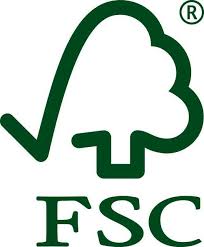
Natural Stone
Harvesting stone does not harm the environment, it is a natural product that is always being created by natural tectonic processes. Stone can also be recycled into other projects. The only downside to natural stone is the transportation costs. Stone is quite heavy and therefore the transporting impact can be significant.
Recommended Products
Godfrey Hirst – Wool Carpet
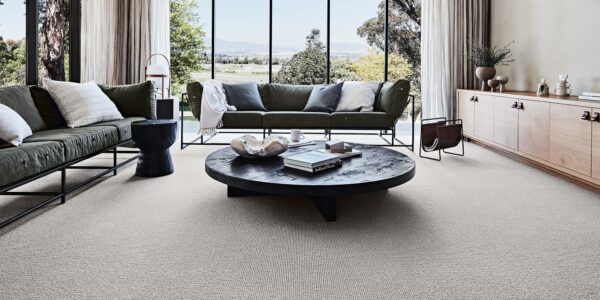
Not only is wool carpet safe on the environment, but it is also safe for your home. Wool will trap and absorb impurities form the air to improve indoor air quality.
Wicanders Wise – Cork Flooring
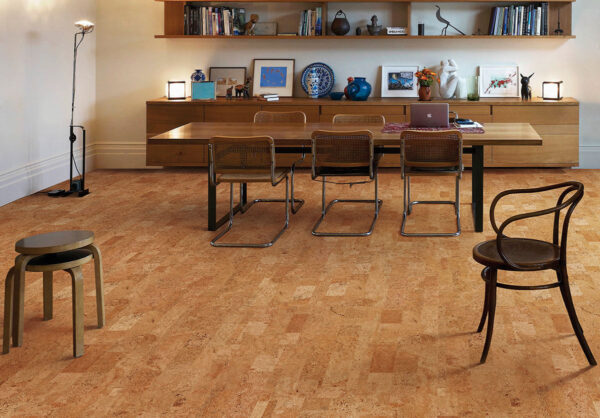
Not only is cork one of the most sustainable flooring products available on the market, but it is also PVC free, a natural thermal insulator, and it is very durable.
Mohawk – PureTech
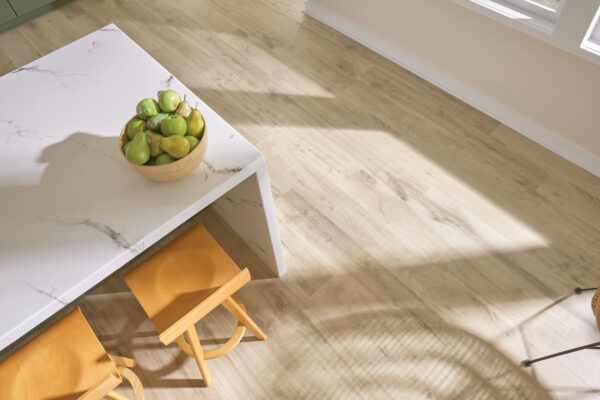
PureTech is 100% PVC-free, is made with 70% total recycled content and has an 80% renewable, organic core. Plus, it is produced in the US so there is less impact for transporting and shipping the product to Canada
Conclusion
Choosing eco-friendly flooring is crucial for creating a sustainable and healthy home. Consider factors like VOC levels, renewable resources, recyclability, material life cycle, and local manufacturing to reduce environmental impact. Opt for materials such as cork, wood, natural fiber carpets, and natural stone, and look for certifications like FSC to ensure responsible sourcing. By making informed decisions, you enhance your home’s quality and support global sustainability efforts, proving that individual choices can significantly impact the environment. Let this guide help you make flooring choices that reflect your commitment to a greener world.

